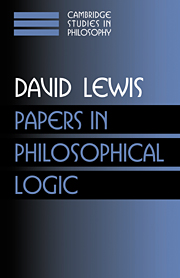Book contents
- Frontmatter
- Contents
- Dedication
- Introduction
- 1 Adverbs of quantification
- 2 Index, context, and content
- 3 ‘Whether’ report
- 4 Probabilities of conditionals and conditional probabilities II
- 5 Intensional logics without iterative axioms
- 6 Ordering semantics and premise semantics for counterfactuals
- 7 Logic for equivocators
- 8 Relevant implication
- 9 Statements partly about observation
- 10 Ayer's first empiricist criterion of meaning: why does it fail?
- 11 Analog and digital
- 12 Lucas against mechanism
- 13 Lucas against mechanism II
- 14 Policing the Aufbau
- 15 Finitude and infinitude in the atomic calculus of individuals (with Wilfrid Hodges)
- 16 Nominalistic set theory
- 17 Mathematics is megethology
- Index
12 - Lucas against mechanism
Published online by Cambridge University Press: 05 June 2012
- Frontmatter
- Contents
- Dedication
- Introduction
- 1 Adverbs of quantification
- 2 Index, context, and content
- 3 ‘Whether’ report
- 4 Probabilities of conditionals and conditional probabilities II
- 5 Intensional logics without iterative axioms
- 6 Ordering semantics and premise semantics for counterfactuals
- 7 Logic for equivocators
- 8 Relevant implication
- 9 Statements partly about observation
- 10 Ayer's first empiricist criterion of meaning: why does it fail?
- 11 Analog and digital
- 12 Lucas against mechanism
- 13 Lucas against mechanism II
- 14 Policing the Aufbau
- 15 Finitude and infinitude in the atomic calculus of individuals (with Wilfrid Hodges)
- 16 Nominalistic set theory
- 17 Mathematics is megethology
- Index
Summary
J. R. Lucas argues in “Minds, Machines, and Gödel” that his potential output of truths of arithmetic cannot be duplicated by any Turing machine, and a fortiori cannot be duplicated by any machine. Given any Turing machine that generates a sequence of truths of arithmetic, Lucas can produce as true some sentence of arithmetic that the machine will never generate. Therefore Lucas is no machine.
I believe Lucas's critics have missed something true and important in his argument. I shall restate the argument in order to show this. Then I shall try to show how we may avoid the anti-mechanistic conclusion of the restated argument.
As I read Lucas, he is rightly defending the soundness of a certain infinitary rule of inference. Let L be some adequate formalization of the language of arithmetic; henceforth when I speak of sentences, I mean sentences of L, and when I call them true, I mean that they are true on the standard interpretation of L. We can define a certain effective function Con from machine tables to sentences, such that we can prove the following by metalinguistic reasoning about L.
C1. Whenever M specifies a machine whose potential output is a set S of sentences, Con (M) is true if and only if S is consistent.
C2. Whenever M specifies a machine whose potential output is a set S of true sentences, Con (M) is true.
C3. Whenever M specifies a machine whose potential output is a set S of sentences including the Peano axioms, Con (M) is provable from S only if S is inconsistent.
- Type
- Chapter
- Information
- Papers in Philosophical Logic , pp. 166 - 169Publisher: Cambridge University PressPrint publication year: 1997



